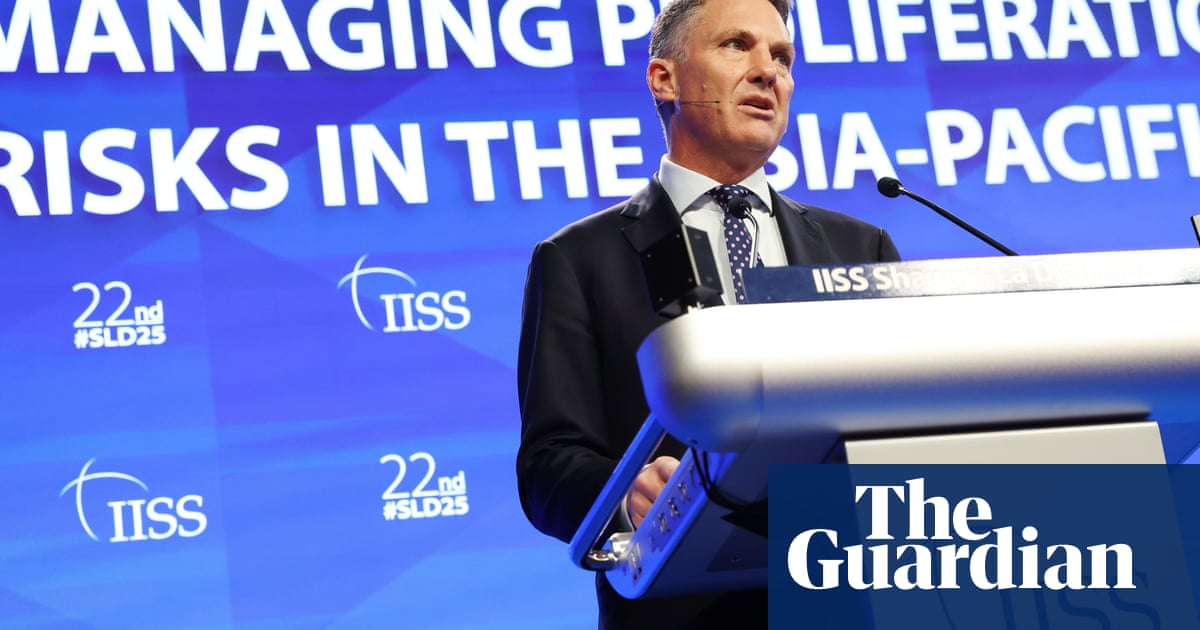Australia’s defence ministerRichard Marleshas lauded the US’s strategic commitment to the Indo-Pacific as“deeply welcome” amid the risk of global nuclear proliferation, while calling for the stabilising force of liberal trade in the region.
In an address at the Shangri-La Dialogue in Singapore on Saturday, Marles said the region had become the “world’s most consequential strategic arena”.
Earlier on Saturday the US defence secretary, Pete Hegseth, told the conference that the Indo-Pacific was a “priority theatre”, in an address calling on Asian countries toboost military spendingto increase regional deterrence against China.
In response to his US counterpart’s remarks, Marles said the US’s commitment to the region was “deeply welcome”.
“The reality is that there is no effective balance of power in this region absent the United States,” he said. “But we can not leave it to the United States alone.”
Sign up for Guardian Australia’s breaking news email
Marles urged “other countries” to contribute and said that Australia was making the “largest peacetime increase in defence spending” since the end of the second world war, including what he called a “generational transformation of the ADF [Australian defence force]”.
He added that theAukuspartnership was “essential” to Australia’s security while playing a role in the region.
“While war and disorder rages in European and Middle Eastern theatres, we can not be complacent here,” Marles said.
He said Russia’s threats to use nuclear arms in Ukraine had “dire consequences” for the Indo-Pacific – which had become the venue for the world’s largest conventional military and nuclear rearmament, as well as “ground zero in the race for technological supremacy”.
Marles said China had decided to “pursue rapid nuclear modernisation and expansion, which aims in part to reach parity with or surpass the United States”. He added that it had “embarked on the largest conventional military buildup since the end of world war two, and it’s doing so without providing any strategic transparency or reassurance”.
“We also have to counter the grim, potentially imminent possibility of another wave of global nuclear proliferation as states seek security in a new age of imperial ambition,” he told the Asian defence summit.
In Hegseth’s address earlier on Saturday, the US defence secretary said the US would conduct its “first-ever live-fire test of its mid-range capability system in Australia” in coming months.
In comments before the summit, Marles said he had told Hegseththat Australia would be willing to have a “conversation” aboutincreasing defence spending, but “wouldn’t put a number on it”.
“What I made clear is that this is a conversation that we are very willing to have, and it is one that we are having, having already made very significant steps in the past,” he told the ABC’s Afternoon Briefing on Friday.
In his address, Marles also said that trade had been the “lifeblood of the Asian region” and the “shock and disruption to trade from high tariffs has been costly and destabilising”.
The regionhas been rocked by the US’s “liberation day” tariffs, including a10% across-the-board tariff on all Australian importsto the US. On Saturday, Trump announced adoubling of steel and aluminium tariffs to 50%.
Marles made the case for liberal trade as a stabilising factor in a “regional balance” , adding that with trade and investment came incentives to “keep the peace”.
“Interdependence is no panacea, but nor is securitisation … Liberal trade matters,” he said.
“Australia will always ensure due attention is paid to the requirements of security, and likewise, we will continue to advocate for closer regional trade and investment integration,” he said.
Timor-Leste president, Dr José Ramos-Horta, speaking alongside Marles in the session discussing the risks of nuclear proliferation in the Asia-Pacific, said that his country watched “from the periphery with growing concern” about the dismantling of the post-second world war order.
In his keynote speech at the summit on Friday, French president Emmanuel Macron said European and Asian countries should form a “positive new alliance” based on shared principles, security, defence and trade, away from the battling superpowers of the US and China.
